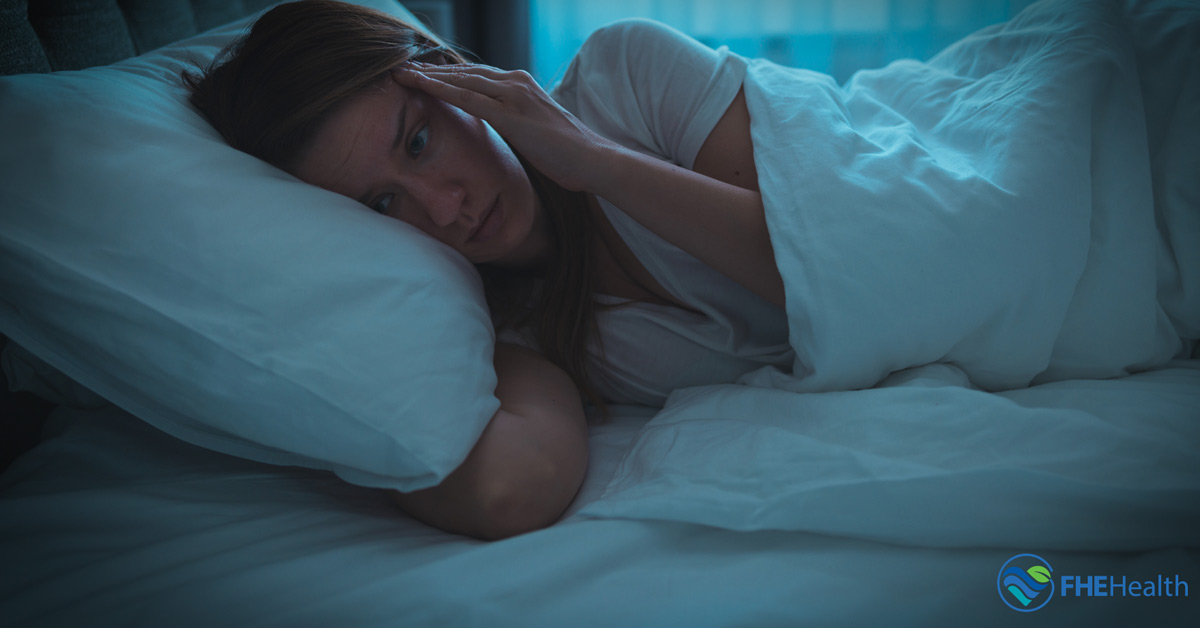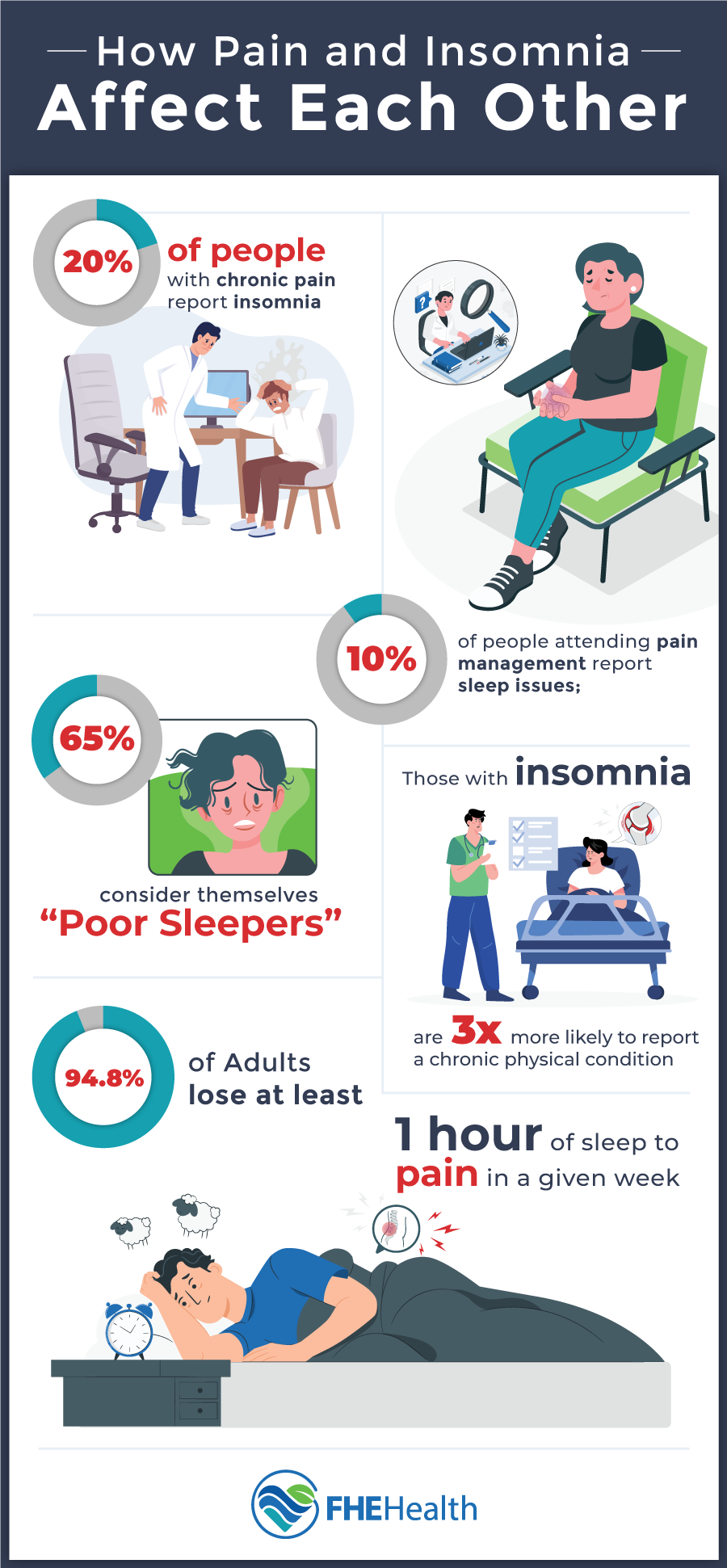
Insomnia can be caused by a broad spectrum of physical and mental conditions. One of the most common physical conditions is pain. Insomnia due to pain, whether acute or chronic, can cause disruption to sleep patterns and make it challenging to fall asleep or stay asleep.
From back and neck pain to fibromyalgia and headaches, pain-induced insomnia can be caused by many conditions. If you’re suffering from acute or chronic pain insomnia and are unsure of where to turn, read on to discover more about the connection between pain and insomnia and what you can do to find relief.
How Chronic or Acute Pain Can Disrupt Sleep and Lead to Insomnia
The connection between pain and sleep disruptions is widely documented. According to a study published by the National Library of Medicine, 20% of people reporting chronic pain had an increased risk of experiencing insomnia.
The discomfort and physical sensations associated with pain can make it hard to fall asleep and stay asleep. Restlessness, difficulty finding a comfortable sleeping position, and even the effects of pain medication can cause severe disruption to sleep patterns. And the cycle continues — chronic or acute pain disrupts sleep, and insufficient sleep makes pain sensitivity worse.
The only way the cycle can be stopped in its tracks is through comprehensive management. The good news is that there’s light at the end of the tunnel. From pain relief and relaxation techniques to sleep hygiene practices and advice from your health care professional, there are many ways to put an end to acute and chronic pain insomnia.
The Impact of Insomnia on Pain Perception and Pain Sensitivity
Did you know that sleep deprivation can affect the body’s natural pain-regulating mechanisms? When we don’t sleep properly, the lack of sleep can have an impact on the brain’s pain processing centers, making even mild discomfort much worse.
If that wasn’t bad enough, insomnia can also cause increased inflammation and a weak immune system. Even people who don’t suffer from a painful condition can wake up feeling achy and stiff after a bad night’s sleep. Improving sleep can help regulate the body’s pain modulation mechanisms, reduce pain sensitivity, and enhance overall well-being.
Pain Relief: Does Tylenol Cause Insomnia?
If you take Tylenol to relieve pain, you might be wondering if there’s a link between this popular pain medication and your sleepless nights. Insomnia isn’t a common side effect of Tylenol. However, some people can suffer an adverse reaction that causes them to have trouble sleeping.
If you’re experiencing insomnia while taking Tylenol, it might be worth bringing this up to your health care professional. They’ll evaluate your symptoms and explore any other underlying causes. They may also recommend alternative pain relief medication where necessary. Always follow the recommended dosage and usage instructions.
Actionable Strategies for Insomnia Due to Pain
Now that we’ve explored the link between pain and insomnia, let’s take a look at some actionable strategies you can use to beat sleepless nights.
Pain Management
If you aren’t already working with a health care professional, it could be time to do so. Working closely with you, they’ll develop a comprehensive pain management plan that addresses the underlying cause of the pain.
Medication Review
Have you had a medication review lately? It could be that the medication you’re taking is disrupting your sleep patterns or having less of an effect on your pain. Your doctor may explore alternative medications for pain management and to address your insomnia.
Your Sleep Environment
Are you sleeping in a comfortable environment that makes it easier to get to sleep and stay asleep? From choosing a supportive mattress and proper bedding to creating a dark, quiet bedroom, there are many ways you can improve your environment.
Practice Relaxation Techniques
If you find it hard to relax before you go to bed, there are many relaxation techniques you can try. These include meditation, deep breathing exercises, progressive muscle relaxation and guided imagery to promote relaxation.
Reset Your Sleep Schedule
Is your sleep schedule erratic? A consistent sleep schedule is important, even on the weekends. Try to go to bed and wake up at the same time each day. You may find you become naturally drowsy each evening once your body and mind are in a set routine.
Adopt Good Sleep Hygiene
You probably already know that scrolling on your phone before you go to bed isn’t good for you. However, you might also be using your phone as a way to amuse yourself while you can’t get to sleep. It’s a vicious cycle. Try to avoid keeping electronic devices in the bedroom and instead, practice some of the relaxation techniques above.
Practice Pain-Relieving Measures
Look to use pain-relieving techniques such as physical therapy exercises, hot or cold packs or topical pain relief you can apply before you go to bed. These methods can help relax muscles, relieve joint pain and bring about a feeling of relaxation throughout the body.
Cognitive Behavioral Therapy
Cognitive behavioral therapy, or CBT for short, is a special therapy that focuses on changing negative behaviors, thoughts and habits that can affect our sleep patterns. By working with a CBT professional, you can discover what causes negative associations with sleep and learn how to combat them.
Seeking Professional Help: How Health Care Professionals Can Address Pain-Induced Insomnia
If you’re struggling to sleep due to pain, a health care provider could help you find an end to this frustrating cycle. The first step in the process is assessing the underlying cause of your pain. From there, your health care provider will suggest appropriate interventions and therapies to reduce discomfort.
Your provider may also recommend a personalized treatment plan. This will typically include a combination of treatments and techniques, such as pain management, sleep hygiene techniques, cognitive behavioral techniques and medication options where necessary. No matter how complex your needs are, your health care provider will give you valuable guidance and support to improve sleep quality and physical comfort.
A Good Night’s Sleep Is Possible
If you’re suffering from insomnia due to pain and not sure where to turn, contact us at FHE to find out more about our personalized programs. Our health care professionals will help you enjoy restful nights without pain once more.







